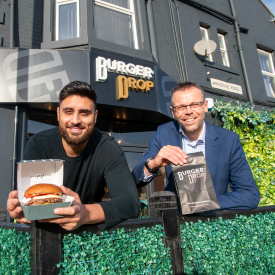There are many opportunities in which to start your career in digital marketing. Whether you want to be a freelancer, a marketing manager, or specialise in a more niche area like SEO or email marketing, you need to know how to get into digital marketing..
Finding your first digital marketing job can be tricky. It’s a familiar, frustrating catch-22 for graduates, career changers, and industry entrants of all kinds: you need experience to get a first job, but you need the job to build that experience.
Luckily, there are several routes and diverse resources available to succeed in digital marketing. Here are the best ways to build the digital marketing skills you need to start your career, even if you have no experience.
Discover our Digital Marketing MSc

Digital marketing jobs
You may be wondering ‘is digital marketing a good job?’ In fact, there are dozens of different roles within digital marketing, and the first step is deciding what suits you best. With so many elements within the industry, most people tend to focus on just one area, at least in the early stages of their career.
Digital marketing career paths and specialisms can include:
- Marketing management
- Search Engine Optimisation (SEO)
- User Experience (UX) or User Interface (UI)
- Graphic design
- Content marketing/copywriting
- Email marketing
- Social media
- Brand strategy
- Web development
- Digital marketing analysis
- Paid search
This is far from an exhaustive list – as and you can imagine, there’s a huge range of information to learn if you want to become an expert in any one of these areas.
How do I get into digital marketing with no experience?
How do you get started in digital marketing? What skills do you need? The answer will vary from role to role. But if you’re new to the industry, you need to build a core understanding of the main areas to land your first digital marketing job:
- Principles of inbound marketing
- Buyer journeys and the marketing funnel
- SEO
- Marketing copywriting
- Social media channels (Twitter, Facebook, LinkedIn, etc.)
- Paid media channels (Google ads, Facebook ads, etc.)
- Digital marketing metrics (Google Analytics, Google Data Studio, understanding clickthrough rates, bounce rates, etc.)
These will all stand you in good stead to enter the digital marketing sector and be able to understand what you’re working on. But how do you learn these skills sufficiently to become capable of doing the job you want?
Step One: Use online digital marketing resources
Digital marketing relies on the internet. Whether it’s sending marketing emails, trending on social media, or relying on organic traffic from search engines for customers to visit your website - practically no marketers today can survive without going online.
One useful thing about this is that digital marketers use the internet to explain and teach others about their methods. Experts in SEO will post blog articles and YouTube videos about how to succeed in their subject area, partly to sell their courses or services, but partly to educate others in the field.
This means that there’s loads of information online for you to pick up new digital marketing skills. By reading some good quality blogs and watching the experts operate, you can start to get into digital marketing without any experience.
Don’t understand what conversion rate optimisation is? Google it – there’ll be hundreds of articles explaining what it means and guides showing you how to carry it out. This is true of practically all areas of digital marketing.
Moz, HubSpot, Neil Patel, Brian Dean, SEMRush, Ahrefs, and Google itself are all good places to start with helpful ‘how-to’ guides and trustworthy, authoritative advice.

Step Two: Start practising your digital marketing skills
Sitting at your computer reading about what A/B testing is or how Google Analytics works is fine and necessary, but nothing teaches you better than doing it yourself. There are a number of ways to put your theoretical skills into practice, which give you a chance to show potential employers that you can actually do what you say.
Do freelance work
Sign up to a site like Freelancer.com and offer your services. You may not be able to charge a very large fee without much experience but set out your skills and services and apply for some advertised roles.
If you can design a landing page for a company as a one-off project, you can use that work as part of your professional portfolio, and it’s great hands-on practice. Ask clients for reviews to build your CV and trustworthiness.
Freelance work can be very rewarding – you might even make an entire digital marketing career out of it.
Start your own business
If you can come up with a product or service you can consistently sell, why not start your own business and market your own skills? It could be marketing related – writing blog posts for example – if that’s your main goal and strength. This gives you the perfect opportunity to apply digital marketing to a client you know very well: yourself.
Write up your own buyer personas, build your website, put some money into paid ads, launch and monitor your business’ social media platforms. Everything you’d do in your first digital marketing job you can do for your own business – just make sure you have enough time left to work on the product or service you’re selling.
Invent a business and practise with that
A less pressurised alternative to launching your own brand – a fake business that you can build a portfolio of work from will suffice just as well to show your abilities to employers.
Imagine the company has asked you to take care of their marketing. This will give you a chance to practise your web design, branding, or content marketing as much as you like with no risk of failure or time pressure. Keep track of your working methods and produce a record of your results to put on your website and send to recruiters.
Network your family and friends – and beyond
Some people don’t know exactly what they want to do. If you know digital marketing is your aim but don’t know where, ask someone who works in the field. Most people are open to having a chat about the options, and they may even be able to recommend you if they know of a good entry-level position.
If you do know the digital marketing specialism you want to focus on, you can find companies and individuals you admire who do the thing you want to do and (politely) contact them. Use their website contact information, LinkedIn, even social media (in a professional manner). Ask how they got into their industry space and what they’d recommend. Everyone starts somewhere and most people are keen to share their story with an interested listener.

Step Three: Apply for a digital marketing course
Is it hard to get into digital marketing?
Getting into digital marketing in the UK without a degree is perfectly possible. But there’s a lot of competition for jobs, and you’ll see many adverts asking for experience and qualifications.
That doesn’t necessarily mean a degree in digital marketing, but if you’re making a career change for example, you’ll have to show employers that you’re invested in the industry and up to scratch with your digital marketing skills.
The best way to show that you have what it takes to do even an entry-level job in digital marketing is to complete a course. There are free or cheap short courses you can find online, as well as full-time on-campus university programmes available. Choosing the right course comes down to a number of factors, including cost, time, quality of teaching, and vocational benefits.
What qualifications do you need to be a digital marketer?
Our distance learning Digital Marketing MSc is taught entirely online and requires no previous digital marketing experience. You’ll study a wide variety of industry-relevant, up-to-date modules, taught by a charismatic faculty of experienced staff.
We understand that having to take a break from your career to do a postgraduate degree is not financially viable for most people. That’s why you can study flexibly, part-time, and online, earning while you learn and balancing work and other life commitments.
Northumbria’s course is also double accredited by the Chartered Institute of Marketing (CIM) and the Data & Marketing Association (DMA), so you can rest assured that when you graduate you’ll have all the skills and career advice you need to get into your first job in digital marketing.
See our course page for more details and start the journey towards your first digital marketing job.



















